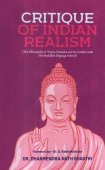Gunaratna, Guṇaratna: 8 definitions
Introduction:
Gunaratna means something in Hinduism, Sanskrit, Jainism, Prakrit. If you want to know the exact meaning, history, etymology or English translation of this term then check out the descriptions on this page. Add your comment or reference to a book if you want to contribute to this summary article.
In Hinduism
Shaktism (Shakta philosophy)
Source: Google Books: ManthanabhairavatantramGuṇaratna (गुणरत्न) refers to “jewels of qualities”, according to the Manthānabhairavatantra, a vast sprawling work that belongs to a corpus of Tantric texts concerned with the worship of the goddess Kubjikā.—Accordingly, “The Khañjinīmata consisting of 1,000 million (verses) [i.e., śatakoṭi] has been uttered . In this way, Śāmbhavīśakti that has no end has become infinite. Śāmbhava, Śākta, and Āṇava have come about by her impulse. She abides (thus) in the three worlds as will, knowledge and action. Bhairava, tranquil and free of defects, resides above Meru. He is rich with the jewels of countless qualities [i.e., aneka-guṇa-ratna-āḍhya] and is encompassed by millions of Rudras”.

Shakta (शाक्त, śākta) or Shaktism (śāktism) represents a tradition of Hinduism where the Goddess (Devi) is revered and worshipped. Shakta literature includes a range of scriptures, including various Agamas and Tantras, although its roots may be traced back to the Vedas.
In Jainism
General definition (in Jainism)
Source: The University of Sydney: A study of the Twelve ReflectionsGuṇaratna (गुणरत्न) refers to “excellent virtues”, according to the 11th century Jñānārṇava, a treatise on Jain Yoga in roughly 2200 Sanskrit verses composed by Śubhacandra.—Accordingly, “This self itself is clearly a great ocean of excellent virtues (guṇaratna-mahārṇava). It is all-knowing, all-pervading, having all forms, supreme [and] pure”.
Source: academia.edu: Tessitori Collection IGuṇaratna (गुणरत्न) or Guṇaratnasūri is the name of a teacher belonging to the same monastic order as Jñānasāgara: the author of the Śāntināthacopaī (dealing with Jain universal history such as the Jinas and related figures), which is included in the collection of manuscripts at the ‘Vincenzo Joppi’ library, collected by Luigi Pio Tessitori during his visit to Rajasthan between 1914 and 1919.—In the final portion of the Śāntinātha-copaī where information about the composition and about the author is given, the following additional information is provided: Guṇaratnasūri head of the monastic order in his time, Lalitasāgara, his teacher’s teacher.

Jainism is an Indian religion of Dharma whose doctrine revolves around harmlessness (ahimsa) towards every living being. The two major branches (Digambara and Svetambara) of Jainism stimulate self-control (or, shramana, ‘self-reliance’) and spiritual development through a path of peace for the soul to progess to the ultimate goal.
Languages of India and abroad
Sanskrit dictionary
Source: Cologne Digital Sanskrit Dictionaries: Aufrecht Catalogus Catalogorum1) Guṇaratna (गुणरत्न) as mentioned in Aufrecht’s Catalogus Catalogorum:—kāvya. Rādh. 21.
2) Guṇaratna (गुणरत्न):—[nyāya] by Somanātha. K. 144.
3) Guṇaratna (गुणरत्न):—kāvya, attributed to Bhavabhūti. Stein 68. Printed in Ha7berlin p. 523.
Source: Cologne Digital Sanskrit Dictionaries: Monier-Williams Sanskrit-English Dictionary1) Guṇaratna (गुणरत्न):—[=guṇa-ratna] [from guṇa] n. ‘pearl of good qualities’, Name of a short collection of sentences by Bhava-bhūti
2) [v.s. ...] ‘pearl of qualities’, Name of [work] on Nyāya [philosophy]
[Sanskrit to German]
Sanskrit, also spelled संस्कृतम् (saṃskṛtam), is an ancient language of India commonly seen as the grandmother of the Indo-European language family (even English!). Closely allied with Prakrit and Pali, Sanskrit is more exhaustive in both grammar and terms and has the most extensive collection of literature in the world, greatly surpassing its sister-languages Greek and Latin.
Kannada-English dictionary
Source: Alar: Kannada-English corpusGuṇaratna (ಗುಣರತ್ನ):—[noun] = ಗುಣಮಣಿ [gunamani].
Kannada is a Dravidian language (as opposed to the Indo-European language family) mainly spoken in the southwestern region of India.
See also (Relevant definitions)
Starts with: Gunaratna gani, Gunaratna suri, Gunaratnagani, Gunaratnakara, Gunaratnakaracchanda, Gunaratnakarachchhanda, Gunaratnakosha, Gunaratnakoshastotra, Gunaratnamala, Gunaratnamaya, Gunaratnasuri, Gunaratnavali.
Full-text: Gunaratnamala, Gunaratnakoshastotra, Gunaratnamaya, Tarkataramgini, Kriyaratnasamuccaya, Gunaratna gani, Tarkarahasyadipika, Gunaratna suri, Shaddarshanasamuccaya, Arnava, Maharnava, Garala, Somanatha, Naiyayika, Prakanda, Svabhavavada, Patisandhi Patisankhana Bala, Marananussati, Satipatthana, Sacca.
Relevant text
Search found 15 books and stories containing Gunaratna, Guṇaratna, Guna-ratna, Guṇa-ratna; (plurals include: Gunaratnas, Guṇaratnas, ratnas). You can also click to the full overview containing English textual excerpts. Below are direct links for the most relevant articles:
Bhagavati-sutra (Viyaha-pannatti) (by K. C. Lalwani)
Part 3 - Dialogue with Skandaka < [Chapter 1]
A History of Indian Philosophy Volume 5 (by Surendranath Dasgupta)
Part 1 - The Literature and History of Southern Śaivism < [Chapter XXXIV - Literature of Southern Śaivism]
Part 1 - The Doctrine of the Pāśupata-sūtras < [Chapter XXXVIII - Śaiva Philosophy in some of the Important texts]
A History of Indian Philosophy Volume 1 (by Surendranath Dasgupta)
Part 1 - The State of Philosophy in India before the Buddha < [Chapter V - Buddhist Philosophy]
Part 4 - An Early School of Sāṃkhya < [Chapter VII - The Kapila and the Pātañjala Sāṃkhya (yoga)]
Part 5 - Sāṃkhya kārikā, Sāṃkhya sūtra, Vācaspati Miśra and Vijñāna Bhiksu < [Chapter VII - The Kapila and the Pātañjala Sāṃkhya (yoga)]
Siddhanta Sangraha of Sri Sailacharya (by E. Sowmya Narayanan)
The Book of Protection (by Piyadassi Thera)
Nyaya-Vaisheshika categories (Study) (by Diptimani Goswami)
Svabhāvavāda or Yadṛcchāvāda < [Chapter 8 - The Theory of Causation]
Related products
